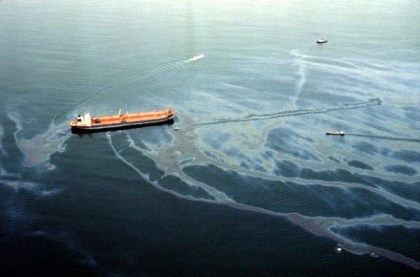Water quality, pollution from shipping
Coastal areas are densely populated because of their highly valued ecological richness and support of human activities. These activities however put pressure on these valuable ecosystems. Industries like power plants, fisheries, mining, shipping and recreation contaminate the coastal waters. But also natural events like storms, erosion, and discharge of sediments have a significant effect on the water quality. Each of these natural and human stresses can deteriorate the water quality in more than one way. Shipping, for example, greatly impacts coastal water quality through ballast water discharge, exhaust emissions, oil spills, solid waste, and sewage such as black water, grey water and bilge water.
Exhaust emissions
Diesel engines burn high sulphur content fuel oil, also known as bunker oil, producing sulphur oxide, nitrogen oxide, atmospheric particulate matter, carbon monoxide, carbon dioxide and hydrocarbons. The US Environmental Protection Agency (EPA) classifies diesel exhaust to be a human carcinogen and recognizes marine diesel exhaust to significantly contribute to acid deposition, eutrophication and nitrification of water.
Oil spills
In addition to oil spilling from daily operations, large oil spills have a devastating effect on the coastal waters. When oil is spilled at sea, it breaks down into various chemical and physical components. These can be coating organisms and coastal habitats, floating or suspended in the water, sunk to the bottom, and buried in sediments.
Credit: Oceanic preservation society
Earth observation is a powerful tool in trying to manage the problems associated with shipping. In 2007 ESA and the European Maritime Safety Agency (EMSA) signed an agreement to enhance cooperation in the field of maritime monitoring and surveillance. Since then there exists a satellite-based oil spill monitoring service covering all European waters and adjacent high seas. Using satellite radar images, this service enables detection of oil slicks after which an alert is sent to EU coastal states and EMSA. This information complements aerial and vessel surveillance observations from coastal Member States, ensuring accurate detection and communication of all significant discharges.
Sewage
Ships dump high quantities of sewage into the sea every day. This waste water is classified by two types; black water and grey water. Black water is sewage from toilets and medical facilities while grey water results from sinks, showers, galleys, laundry and other cleaning activities aboard a ship. Sewage can contain many harmful substances like bacteria, viruses, parasites, pathogens, detergents, oil and grease, metals, organic compounds, medical waste and nutrients such as nitrogen and phosphorous which are known to cause excessive algal blooms.
Bilge water
The bilge is the lowest part of the hull of a ship. Oil from engines and machineries may leak down into the bilge, mixing there with water. Bilge water may also contain solid wastes, chemicals and other pollutants. To maintain ship stability and avoid hazardous conditions in this area, the bilge needs to be flushed and periodically pumped dry. In order to achieve this the oil accumulated there needs to be extracted by a separator. This process may not be accurately or sufficiently carried out, resulting in discharge of harmful products in to the coastal waters.
Solid waste
In addition to sewage there is a huge amount of solid waste generated on a ship. This includes glass, paper, cardboard, aluminium and steel cans and plastics. Some of the solid waste is landed ashore for disposal or recycling but most of it is incinerated on board while the ash is discharged at sea. One can imagine that the amount of solid waste produced on board large cruise ships, can be massive. For a large cruise ship, about 8 tons of solid waste is generated in one week. Garbage such as glass and aluminium can not be incinerated and have to be off-loaded in ports, but these are often not equipped to adequately dispose of the large amounts of waste coming from cruise ships.


This page has no comments.